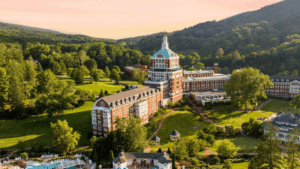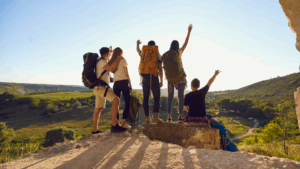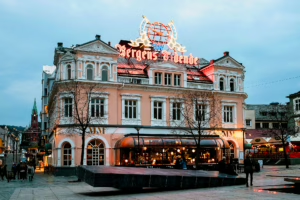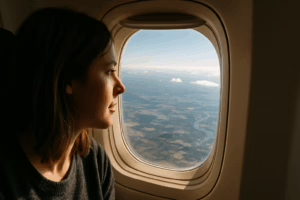Ghana’s Diaspora Bonds: A Unique Journey
For many in the African diaspora, Ghana is one of the countries that people visit for a personal pilgrimage. Since launching the “Year of Return” in 2019, which marked 400 years since the first enslaved Africans arrived in Jamestown, Virginia, Ghana has actively welcomed descendants of the transatlantic slave trade, especially those living in the United States, to reconnect with what might be considered for some, their ancestral homeland.
The “Year of Return” kicked off a national effort rooted in education and cultural reclamation. The solemnity of visiting Cape Coast or Elmina Castle, where captives were held before being shipped across the Atlantic, is an unforgetably experience and has forever shaped the history of the world. These painful moments in remembrance of these crimes against humanity are often paired with experiences that celebrate victory and and a rich heritage. Cultural workshops, naming ceremonies, and visits to local villages allow visitors to establish cultural ties for those whose lineage was lost to slavery uninformed, misinformed, and hidden history.
In 2020 and beyond, the government has extended this initiative through “Beyond the Return,” focusing on investment, cultural exchange, and long-term engagement with the diaspora. Now, African Americans are purchasing property, opening businesses, residency, and even taking up citizenship. Ghana has positioned itself not just as a welcoming destination but as cultural homecoming, and in do so is prospering her economy.
The Pulse of Accra: Urban Energy and Innovation
Ghana’s capital city, Accra, offers a dynamic contrast to the country’s coastal calm and rural traditions. It is a sprawling metropolis where modern Ghanain identity is constantly being shaped through creativity, activism, and entrepreneurship. For travelers who want more than just beaches and historic sites, Accra delivers an immersive urban experience, one that is unapologetically Afrocentric and forward-looking.
The city’s art scene continues to gain global attention. Galleries like Nubuke Foundation and Gallery 1957 showcase a new generation of Ghanaian artists engaging with identity, politics, and social change. Beyond the galleries, the city buzzes with live music,from Highlife to Afrobeat, and pop-up fashion shows that echo Ghana’s textile legacy while embracing streetwear culture.
Accra is also a hub for African tech innovation. The city plays host to growing co-working spaces and tech hubs like Impact Hub and MEST Africa, drawing digital nomads and entrepreneurs from across the continent. Cafés like Jamestown Coffee Company and Vida e Caffè serve as informal networking spots where young Ghanaians exchange ideas over lattes. In Accra, the future of West Africa feels tangible. It is a city that invites engagement, not observation.
A Historical Tapestry Woven Through Time
Ghana’s significance in African and global history is impossible to overstate. From the ancient Ashanti Empire to its pivotal role in the transatlantic slave trade, Ghana carries the weight of memory with remarkable dignity. The castles that line the coast, such as Cape Coast Castle and Elmina Castle, are haunting in their preservation. They serve not only as UNESCO World Heritage sites but as living monuments to the pain and resilience of the African diaspora.
For Black travelers in particular, Ghana has become a place of pilgrimage. The “Year of Return” initiative in 2019, launched by the Ghanaian government to mark 400 years since the first enslaved Africans arrived in Jamestown, Virginia, brought international attention. According to the Ghana Tourism Authority, the campaign attracted over a million visitors and contributed $1.9 billion to the economy. But beyond the numbers, the initiative sparked emotional journeys for those seeking reconnection with their ancestral roots.
Visiting Ghana is not just a lesson in history. It is an immersion in stories, pride, and a powerful narrative of survival and renewal.
Accra: Africa’s Rising Cultural Capital
If Lagos is Nigeria’s pulsating business center, Accra is Ghana’s beating cultural heart. The capital city pulses with creativity, music, and a bustling street life that defies easy categorization. Artists, designers, chefs, and musicians are reshaping the city’s image from the inside out.
At the forefront is the neighborhood of Osu, where art galleries like the Nubuke Foundation and contemporary spaces such as the ANO Institute of Arts and Knowledge offer a look into Ghana’s modern identity. Fashion houses like Christie Brown and Studio 189 blend traditional textiles with global silhouettes. Meanwhile, Makola Market remains unapologetically chaotic and delightfully sensory, a counterpoint to curated spaces but no less representative of Accra’s spirit.
In the evenings, Accra comes alive with afrobeats and azonto rhythms spilling from lounges and beach bars. Places like +233 Jazz Bar & Grill offer a more mellow, live music experience, while spots such as Sandbox Beach Club cater to the younger crowd with a blend of upscale dining and seaside ambience.
From Cape Coast to Axim: The Allure of the Atlantic
Ghana’s coastline stretches over 300 miles, lined with palm-fringed beaches, fishing villages, and resort towns that invite a slower pace. While many visitors begin with Cape Coast, which offers both historical depth and oceanfront serenity, the journey westward reveals hidden gems.
Kokrobite, just an hour from Accra, offers a backpacker-friendly vibe with music-filled nights and drumming workshops at Big Milly’s Backyard. Farther down the coast, Busua and Butre are quieter beach towns known for surfable waves, community-owned guesthouses, and lush hills that meet the sea. Busua’s lifestyle cafes like Coffee Corner and African Rainbow Resort speak to an evolving eco-tourism ethos.
Axim, near the western border with Côte d’Ivoire, is less frequented but no less striking. The Lou Moon Resort, nestled in a private bay, is a prime example of understated luxury in harmony with the natural environment. The coastline is more than a postcard backdrop. It is where fishermen pull in the day’s catch, children play barefoot in the surf, and tourists are invited to witness rather than consume.
The Warmth of Ghanaian Hospitality
There is a phrase often repeated in Ghana: “You are welcome.” It is not said in passing. It is delivered with sincerity, often with a hand over the heart. Ghanaian hospitality is not performative. It is woven into everyday interactions, from street vendors offering you their best fruit to elders sharing wisdom and laughter during evening conversations.
Travelers consistently note the friendliness of Ghanaians. According to a 2023 report by the African Travel and Tourism Association, Ghana ranks among the top African countries for solo traveler safety and community-based tourism initiatives. In the rural north, where visitors may attend a traditional durbar or naming ceremony, the warmth is even more palpable. Language may differ from region to region, over 80 local dialects are spoken, but kindness is a constant.
Whether you are staying at a guesthouse in Kumasi or chatting with a cab driver in Tamale, the invitation to feel at home is genuine.
Festivals that Fill the Streets and the Soul
Timing your visit around one of Ghana’s many festivals can offer a completely different travel experience. These events are not staged performances. They are vibrant expressions of living traditions and cultural pride.
The Chale Wote Street Art Festival, held annually in Accra’s Jamestown district, is arguably the most famous among international travelers. A mashup of mural painting, live performances, street theater, and fashion parades, it transforms the capital into a canvas of contemporary African expression.
In the Volta Region, the Hogbetsotso Festival commemorates the migration of the Anlo Ewe people and features elaborate drumming, dance, and pageantry. The Aboakyir Festival in Winneba, where young men compete to capture a live antelope, is equally captivating. Each festival has its own rhythm, its own story, and its own deep connection to the land and its people.
These gatherings are not simply for spectacle. They are essential reminders that Ghana’s cultural heartbeat has not skipped a beat.
A Culinary Landscape Rooted in Flavor and Family
Ghanaian cuisine is unapologetically bold, built on layers of spice, slow-cooked stews, and the foundation of staples like yam, plantain, cassava, and rice. To eat in Ghana is to understand something about community. Meals are often shared from a communal bowl, a symbol of unity and trust.
Dishes like jollof rice, Ghana’s entry in West Africa’s unofficial culinary rivalry, are just the beginning. Fufu served with light soup, waakye with its medley of accompaniments, and kenkey paired with fresh fish and shito pepper sauce all showcase the complexity of Ghanaian cooking.
Street food is an adventure in itself. Kelewele (spicy fried plantains) sold by roadside vendors, grilled tilapia served with banku, or bofrot (fried dough balls) for breakfast provide a full spectrum of flavor at every turn. In Accra, new culinary voices are also emerging. Restaurants like The Gold Coast, Skybar25, and Santoku are reimagining traditional flavors for a global palate.
A Sense of Belonging
Perhaps the most compelling reason to visit Ghana is not one you will find in any guidebook. It is the feeling of belonging that lingers long after the trip ends. For many members of the African diaspora, visiting Ghana is less of a vacation and more of a return. It is an emotional, sometimes spiritual journey back to a land whose stories live in their bones.
Even for those without ancestral ties, Ghana offers a level of human connection that is increasingly rare in the modern travel experience. It is in the shared laughter with strangers. The spontaneous dance circles. The grandmother who insists you taste her homemade groundnut soup. It is an experience that reminds you travel is about more than place. It is about people.
Ghana may not be the easiest destination to categorize. It is both historical and futuristic, rural and urban, laid-back and electrifying. But that is exactly why it stays with you. It does not ask you to visit. It invites you to return.
TL;DR: Why Ghana Should Be Your Next Travel Destination
- Ghana offers powerful historical sites like Cape Coast Castle, central to understanding the African diaspora
- Accra is a vibrant capital alive with arts, music, and emerging fashion
- The coastline offers both relaxation and adventure, from Kokrobite to Axim
- Ghanaian hospitality is warm, genuine, and unforgettable
- Festivals bring culture to life in real-time, from street art to royal ceremonies
- Ghanaian cuisine is rich, communal, and full of flavor, from jollof to grilled tilapia
- A visit to Ghana is more than a trip—it is a connection to culture, history, and humanity















